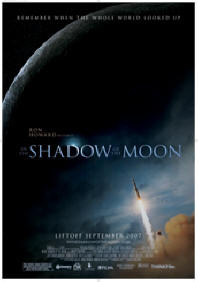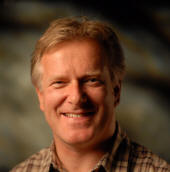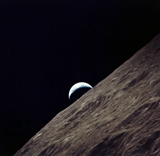|
|
![]()
Apollo Moon Documentary
Bears Witness for a Creator
By Mark Ellis, Senior Correspondent, ASSIST News Service, October 16, 2007
 film poster |
LONDON (ANS) -- A film documenting the Apollo moon project using rare footage from NASA contains numerous spiritual references pointing to the existence of God. “In the Shadow of the Moon” (here's the trailer) opened September 7th to positive reviews, including a “Critic’s Choice” designation by the L.A. Times and an award at the 2007 Sundance Film Festival. “It’s a film about the experience of going to the moon told by the people who went – in their own words,” says David Sington, who directed the film. One of Sington’s associates got acquainted with Dave Scott, commander of Apollo 15 and the first man to drive on the moon. “They wanted to organize a reunion of moonwalkers,” Sington says. “That grew into an idea of doing a reunion on film.” Producer Duncan Copp proposed the idea of a documentary to Sington, who said it took him only 15 milliseconds to decide on the project. |
With astronaut Scott’s help, the film team managed to assemble crewmembers from every Apollo mission that flew to the moon and interview them directly on camera. The 10 astronauts – now in their seventies – come across as surprisingly reflective and human. Many spoke of the profound impression they gained from walking on the lunar surface and gazing back at a marble-sized planet Earth.
In addition to the interviews, producers Duncan Copp and Chris Riley spent weeks at NASA’s film library in Houston pouring through cans of film – many of which had not be opened for 30 years. They uncovered a veritable treasure trove, which the filmmakers re-mastered to produce a film of striking visual clarity.
Apollo 16 astronaut Charlie Duke, the 10th man to walk on the moon, makes an explicit declaration of his faith in Jesus Christ on camera. His spiritual revelation came after his retirement from the space program in the mid-seventies. Mounting pressures in business and his personal life caused Duke to grapple with life’s ultimate questions. In 1978, after he attended a Bible Study about Middle East prophecy, Duke realized Jesus “really is the Son of God.”
Astronauts Edgar Mitchell and Gene Cernan described profound spiritual experiences, but not within a specific Christian context. Cernan discovered the universe seemed to have purpose behind it, that there must be a Creator who stands above the religions of mankind.
 Director David Sington |
“Edgar Mitchell’s experience profoundly changed and shaped his whole life,” notes director Sington. “He had a moment of epiphany – suddenly grasping who he is in relation to the universe. This was accompanied by a sense of ecstasy, almost like people who have had visions of the Virgin Mary.” “He’s striving to understand his spiritual epiphany in scientific terms,” Sington adds. “He’s dedicated his life to understanding human sub consciousness and to finding the ‘Great Mind’ of the universe.” |
| In Irwin’s book, “To Rule the Night,” he described his view of Earth from the moon, which looked like “a beautiful, fragile Christmas tree ornament hanging against the blackness of space.” The beauty of the mountains of the moon moved Irwin, and he said he felt the presence of God during his moonwalk. “The moon has a powerful force; it seems to affect the feelings and the behavior of everybody. I cannot imagine a holier place,” he wrote. Some would consider the trip to the moon as one of man’s greatest accomplishments, but Irwin had a different perspective. Afterward, he frequently said, “I believe Jesus Christ walking on the earth is more important than man walking on the moon.” |
 Crescent Earth view from Apollo 11 |
Irwin retired from NASA in 1972 and founded High Flight, a Christian ministry. He traveled frequently and spoke to groups about the ways his experiences in space increased his awareness of the presence of God.
“My view is that all of them were profoundly affected by the experience of leaving the Earth and seeing the Earth in its true context,” Sington says. “The photographs they took were a revelation to everybody that helped shape the way we think of ourselves on the Earth,” he notes.
Some might consider the awareness gained by the men who walked on the moon as the ultimate mountaintop experience. “They had the experience firsthand, which is a different order of experience.”
Many of the astronauts saw the universe as fundamentally sterile, a seemingly endless dead expanse. By contrast, Earth appeared to be a very special oasis -- almost Edenic, and yet fragile. For some, this increased their environmental awareness, as well as a sense of gratitude about living on planet Earth. “They feel life in a slightly stronger way than the rest of us,” Sington observes.
Apollo 11 astronaut Mike Collins, the most affable of the astronauts to appear on camera, described a moment of exaltation in his orbiter as he realized he was alive in a place where there was no other life.
One of director Sington’s disappointments was his inability to persuade Neil Armstrong to abandon his notoriously reclusive nature and appear in the film. “I think I understand why he doesn’t want to talk about being on the moon,” Sington says. “He sees himself as a messenger, not the message, a representative of all of us. He takes that very seriously.”
Sington came away from the film more inclined to accept a spiritual dimension to life. It also made him a bit more optimistic about the future, based on the Apollo project’s demonstration that human societies – particularly democracies -- are capable of large-scale collective efforts apart from waging war.
“In some sense perceiving reality is spirituality,” Sington concludes. “Religion and Christianity says we’re missing what’s really important,” he says. “When you see things as they really are you get a more profound spiritual sense.”